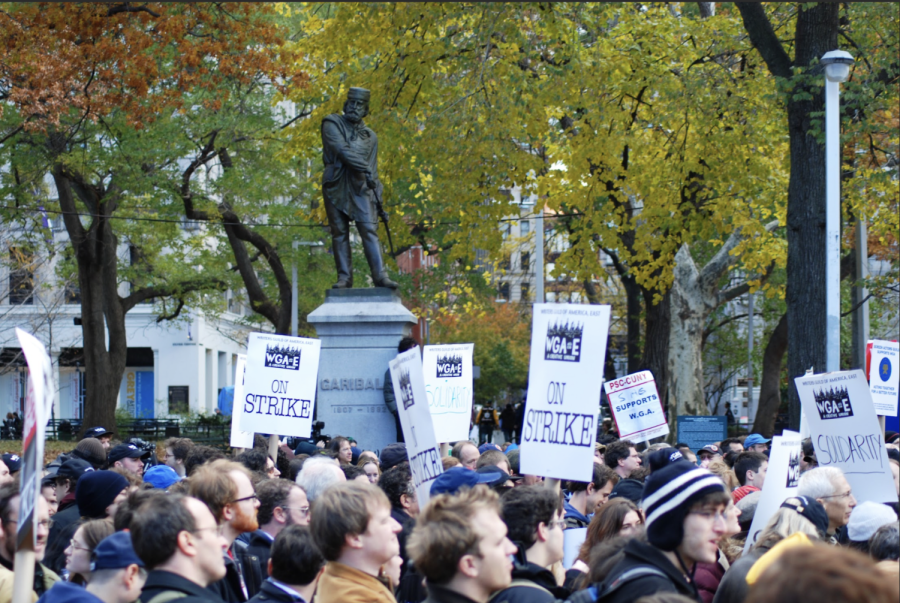WGA Goes on Strike
June 9, 2023
Behind every piece of media, there’s a writer — creating scripts, blocking scenes, and explaining the emotions and intention behind each word on the page.
On May 2, the Writers Guild of America (WGA), a union that represents close to 20,000 writers in Hollywood, announced in a letter that, after failing to reach an agreement with the Alliance of Motion Picture and Television Producers (AMPTP), they would be going on strike and expected all members to follow strike rules. The strike required that all members immediately stopped writing and submitting their literary material to all struck companies, which are companies represented by the AMPTP. Struck companies include Walt Disney Pictures, Universal Television, NBC Universal, and Amazon Studios, among others, according to the Hollywood Reporter.
The 2023 strike is not the first one taken by the WGA in its 90-year history. The most recent strike before this year took place between November 2007 and February 2008. This strike began with the purpose of increasing funding for writers, as compared to the profits made by major corporations. It caused hundreds of thousands of non-writing staff to be laid off by TV companies, due to production on scripted shows being stopped. It also led to an increase in unscripted television shows, such as NBC’s “The Apprentice” and ABC’s “Wife Swap,” because they were far cheaper to produce. During this strike, CBS also produced additional episodes of the game show “The Price is Right” and an additional season of the competition-reality show “Big Brother.” However, that season is regarded as one of the worst in the show’s history, according to Entertainment Weekly and fans of the show.
Prior to the beginning of the current strike, there was a six-week negotiation period between the chief WGA negotiators David Young and Ellen Stutzman and the AMPTP. The key components of their negotiation deal were separated by features (film), episodic television, and streaming. For features, the main concern of the Writers’ Guild was centered around pay. Their offer was for Guild members to receive 50% of their pay upon the beginning of the project, with the remaining 50% to be paid out weekly throughout the writing period. The AMPTP rejected the offer and failed to provide a counter.
For episodic television, Guild negotiators focused on “preserving the writers’ room” and the duration of employment for writers. In pre-greenlight rooms, negotiators asked for there to be a minimum of six writers present, including four who would be credited as writer-producers, which is a person responsible for developing, writing, and producing scripts for television programs and episodes. In post-greenlight rooms, negotiators asked for there to be one writer per episode, with an additional writer required for every two episodes. The example provided was that a TV series with eight episodes would require seven writers, including the four writer-producers. Regarding the duration of employment, in pre-greenlight rooms, negotiators asked that the writing staff be guaranteed at least ten consecutive weeks of work. In post-greenlight, writing staff must be given at least three weeks to work on each episode’s script, and up to a maximum of 52 weeks, or a year. Additionally, negotiators asked for half of the minimum required staff to be employed through production and one writer employed through post-production. All of the aforementioned requests were rejected by the AMPTP, with no counteroffer given.
With streaming services, the WGA negotiators asked for there to be a viewership-based residual given to writers — essentially asking that the compensation writers receive each time their television work airs is based on the number of people who see it, meaning that if more people watch a particular episode of a TV series, the credited writers’ compensation would increase. This offer was rejected by the AMPTP, with no counter offered.
An additional focus of the WGA negotiations revolved around the use of artificial intelligence in writing. The WGA asked for the AMPTP to “regulate the use of artificial intelligence on MBA-covered projects.” The MBA, or minimum basic agreement, is the bargaining agreement that covers the “benefits, rights, and protections for most of the work done by WGA members,” according to the Writers Guild of America, East. The AMPTP responded to this request by rejecting the proposal and countering by saying there could be “annual meetings to discuss advancements in technology.” In a tweet, WGA East Vice President Lisa Cullen wrote “the WGA’s fight on AI is existential, not just for writers but for the whole entertainment community” and “machines and the corporations that use them should not be able to capitalize on our work without checks and balances.” The WGA’s stand against AI’s use in media is the biggest one from the entertainment industry to date.
How will television be impacted by this current strike? Late-night television shows such as Jimmy Kimmel Live, The Late Show with Stephen Colbert, and The Tonight Show Starring Jimmy Fallon all went off the air the day of the strike. Saturday Night Live also stopped releasing new episodes – reruns began on May 6 and new episodes starring Pete Davidson and Kieran Culkin as hosts were canceled. Television programs impacted by the strike include the third season of Abbott Elementary, the second season of The Last of Us, and the fifth and final season of Stranger Things. Abbott Elementary writer-producer, actress, and member of the WGA, Quinta Brunson expressed that, as a member of the Guild, she “supports [them], and them getting [union members] what [they need]” and being able to “rectify” the situation between the Guild and production companies. Stranger Things showrunners Matt and Ross Duffer wrote in a tweet that “writing does not stop when filming begins” and production would not start until the strike was over.
Writing makes the entertainment industry what it is today, and all writers deserve to be compensated properly and protected for all the efforts put into getting our favorite scenes and characters from paper to the big screen.


























